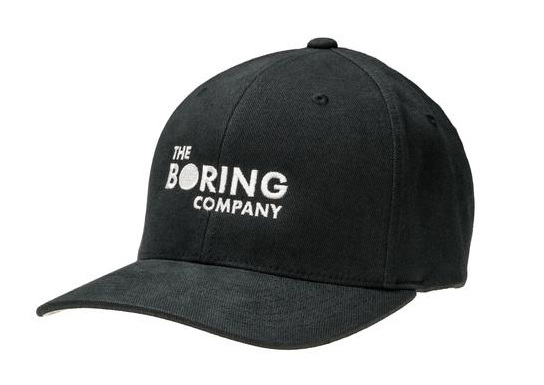Elon Musks starts 2018 with an extra million bucks for his ambitious tunneling project that he claims could help to banish traffic congestion at street level.
The pile of cash comes thanks to sales of the “boring” caps that Musk began offering in October, 2017.
The $20 cap comes with the name of Musk’s tunneling outfit — The Boring Company — emblazoned on the front, and the CEO recently revealed the headwear has sold out.
Musk, who also leads SpaceX and Tesla, set the sales limit to 50,000 caps and hit the target 
While $1 million is admittedly a tiny fraction of the project’s expected costs, the tongue-in-cheek hat-based venture has at least helped to spread the word about what The Boring Company wants to achieve.
If you’re still not in the know, then allow us to explain: The Boring Company wants to build a kind of futuristic freeway, first beneath the streets of Los Angeles, as part of a transportation system that would see cars whizzing through tunnels on track-based electric-powered sleds at speeds of up to 150 mph.
Vehicles would be lowered from the street to the sled using an elevator system, while pedestrians and cyclists would enter large pods available for public use. The high-speed sleds would move from numerous side tunnels onto the main track in order to keep all passengers constantly on the move. “This is a big difference compared to subways that stop at every stop, whether you’re getting off or not,” Musk said.
The Boring Company claims it can drill tunnels more efficiently than current systems, and in October revealed it had already started work on its first route, “roughly parallel” to Interstate 405 from Los Angeles International Airport to Route 101.
Musk has also said the company is in talks with officials about using his tunneling equipment to build subterranean Hyperloop systems connecting major cities on the East Coast.
Whether Musk can drill his way to subterranean success depends on a number of factors, not least green lights from regulators and sufficient funding.
And whether that funding comes from another sales effort by Musk remains to be seen, though he has on more than one occasion hinted at a particularly offbeat plan: “Hats sold out, flamethrowers soon!” he tweeted recently. Is a “boring” flamethrower really on the cards? Somehow we wouldn’t put it past the guy …
Editors' Recommendations
- Elon Musk’s Boring Company plans ‘Not-a-Boring’ boring contest
- Pablo Escobar’s brother pours fuel on the flamethrower feud with Elon Musk


